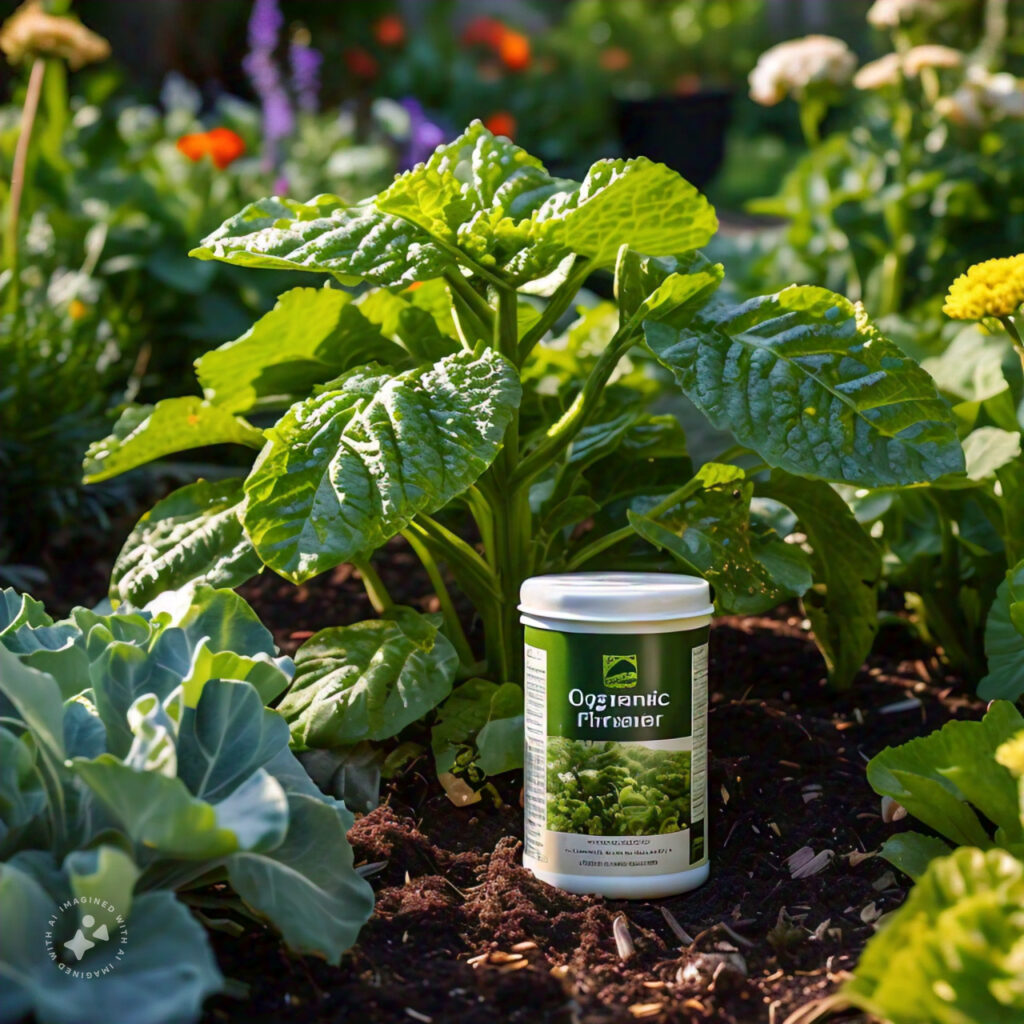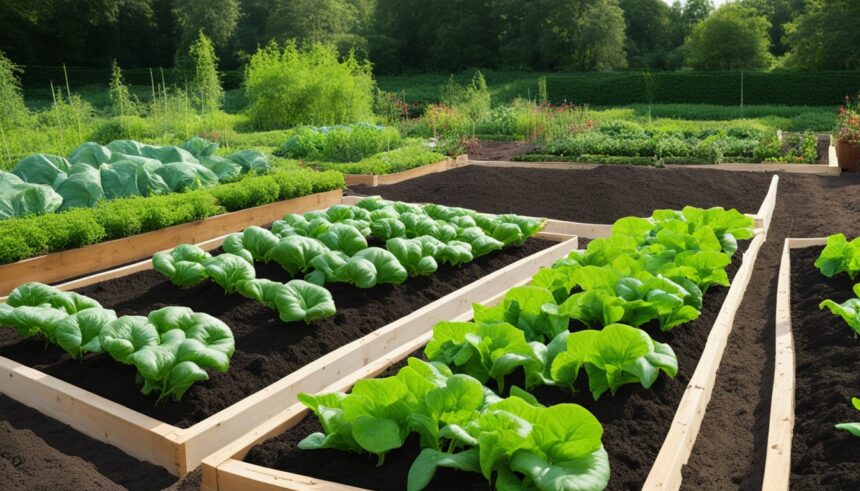Are you tired of using harsh chemical fertilizers that can hurt your soil and the planet? Learn about the amazing benefits of organic fertilizers for your vegetable garden. These natural options can increase your harvest and help your soil stay healthy. But what makes organic fertilizers special, and how can they make your garden better? Find out in this detailed guide.

What are Organic Fertilizers?
Organic fertilizers come from natural stuff like plants, animal waste, and minerals. They slowly release nutrients, making soil better and helping good microbes. They don’t give nutrients all at once like synthetic ones do. Instead, they feed plants over time.
Types of Organic Fertilizers
Here are some common organic fertilizers:
- Manure: Comes from farm animals and has lots of nutrients.
- Compost: Made from broken-down plants and animal waste, it makes soil better.
- Blood meal: A fertilizer made from dried animal blood, high in nitrogen.
- Bone meal: Gives phosphorus and calcium, helping roots and plants grow strong.
- Seaweed extracts: These have many nutrients and help plants grow.
Choosing the Right Organic Fertilizer
When picking an organic fertilizer, think about your soil and what your plants need. Each fertilizer has different nutrients like nitrogen, phosphorus, and potassium. Look up the best ones for your veggies and think about when to apply them.
For a balanced diet for your plants, choose fertilizers with a similar N-P-K ratio, like 5-5-5 or 6-6-6. Also, make sure they have other important nutrients. This helps your veggies grow well and produce more.
Enhancing Soil Quality with Organic Fertilizers
For a thriving vegetable garden, soil quality is key. Organic fertilizers give your plants the nutrients they need. They also make the soil better overall.
These fertilizers add organic matter to the soil. This makes the soil better at holding water and letting air in.
Improving Soil Structure and Water Retention
Adding organic fertilizers to your garden beds makes the soil better in many ways. The organic matter helps the soil stick together, forming bigger clumps. This makes the soil hold onto water better, preventing it from running off. It also helps plants get the water they need.
It also helps roots grow and plants get nutrients, making them healthier and more productive.
Studies show that using organic fertilizers can make crops grow more than using mineral ones. For example, you might need 9 tons of cow manure to get 90 kg of nitrogen for maize. But you’d only need 200 kg of Urea for the same amount of nitrogen.
Organic fertilizers also help the good guys in the soil, like bacteria. These bacteria break down organic matter, giving plants the nutrients they need. This makes the soil richer and your garden stronger.
Using organic fertilizers in your garden brings many benefits. They make the soil better and help your plants grow strong. This leads to a healthier garden and a better environment for growing.
Promoting Plant Growth and Yield
Organic fertilizers are a big deal for gardeners. They give plants the nutrients they need for strong growth and lots of produce. These fertilizers release nutrients slowly, so plants get what they need all season without too much or too little.
This means your plants will have healthy leaves, strong roots, and lots of tasty veggies. Organic fertilizers also make the soil better for plants. They help good microbes in the soil, making nutrients available and keeping the soil healthy. This makes your plants stronger.
- Organic fertilizers release nutrients slowly, reducing the risk of burning plants.
- They improve soil structure, aiding in better support of plant growth.
- Organic fertilizers promote beneficial microbes that enhance nutrients and improve soil health.
It’s important to pick the right organic fertilizer for your garden. Think about your soil type, what your plants need, and what the fertilizer offers. Always read the label to know what’s in it and how to use it.
Using organic fertilizers can really help your garden grow. You’ll get more from your plants and enjoy food that’s full of nutrients. Going for these natural options is a great way to make your garden healthy and sustainable.
Eco-Friendly and Sustainable
Organic fertilizers are better for vegetable gardens than synthetic ones. They don’t harm the environment like synthetic fertilizers do. Organic fertilizers don’t cause harmful chemical runoff or pollution. This keeps water sources clean and protects aquatic life.
Using organic fertilizers in your garden is good for the planet. It’s a sustainable way to grow food. It also helps reduce pollution and supports a healthier environment.
Reducing Chemical Runoff and Pollution
Organic fertilizers come from natural stuff like plant waste and animal manure. They give nutrients to plants slowly and steadily. This means less chance of these nutrients getting into water and causing problems.
- Organic fertilizers don’t have synthetic chemicals that pollute the environment.
- They help soil stay healthy, which means it keeps water and nutrients better. This cuts down on runoff.
- Using organic fertilizers and gardening methods helps many kinds of living things in the soil and around your garden.
Choosing organic fertilizers for your garden shows you care about the planet. It’s good for your plants and the whole ecosystem. It makes the environment healthier for all living things now and in the future.
Organic Fertilizers for Vegetables
Organic fertilizers are a great choice for your vegetable garden. They offer a natural way to feed your plants. You can use compost, manure, bone meal, and seaweed extracts to help your vegetables grow strong.
Using organic fertilizers helps you grow tasty, healthy vegetables. It also makes your garden better for the planet. These fertilizers feed your plants and make the soil better. They help keep water in the soil and support good soil life.
Some top organic fertilizers for vegetables are:
- Compost: This is the most common organic fertilizer. It gives plants lots of nutrients and makes the soil better.
- Manure: Manure from animals like cows, horses, rabbits, and chickens is good for your garden. Make sure it’s composted for at least nine months before using it.
- Liquid Fertilizers: You can mix fish and seaweed emulsions with water. This gives plants a quick nutrient boost.
- Vermicompost: This is when worms are raised for their castings. It adds good microbes to the soil, helping plants grow and get nutrients.
- Commercial Organic Fertilizers: Companies like Gardener’s Supply and Gardens Alive have many organic fertilizers. They help different vegetables grow well.
When picking organic fertilizers, think about what your plants need. Plants need nitrogen, phosphorus, and potassium (NPK) to grow well. The right NPK mix depends on the vegetable. For example, tomatoes and root crops do well with a 5-10-10 mix.
Using organic fertilizers makes your garden sustainable and your produce nutrient-rich. Try different organic fertilizers to see what works best for your garden.
Slow-Release and Long-Lasting Effects
Organic fertilizers are great for your vegetable garden because they release nutrients slowly. They don’t wash away quickly like synthetic ones can. This slow release means your plants get the nutrients they need, when they need them.
This way, you don’t have to worry about giving your plants too much food. It’s good for your plants and the environment. It helps keep the soil healthy and your plants strong.
No Risk of Plant Burning
Organic fertilizers last a long time, making your garden better over time. You don’t need to keep adding more fertilizer often. This lets you enjoy your garden more.
They are also good for the planet. They don’t harm the water or soil like some other fertilizers do. Choosing organic fertilizers is a smart move for your garden and the earth.
How fast or slow these fertilizers work can depend on a few things. Things like the coating on them, the temperature, and how wet the soil is. Some use technology to control how fast the nutrients come out. Others use natural ways to slowly break down and release nutrients.
To get the most out of slow-release fertilizers, follow the instructions carefully. Make sure you apply them at the right time and in the right amount. Keep an eye on your plants and adjust as needed. With these tips, your garden will be full of healthy, beautiful plants.
Supporting Beneficial Soil Microbes
Organic fertilizers are key to helping beneficial soil microorganisms. These include bacteria, fungi, and protozoa. They are vital for nutrient cycling, plant growth, and soil health. Using organic fertilizers helps create a healthy soil ecosystem that supports your vegetable crops.
Soil microorganisms are crucial in vegetable gardens. They break down organic matter and release nutrients. Organic fertilizers like compost and manure feed and house these microbes, letting them do their job.
Organic fertilizers give your plants nutrients and help the soil microbiome. This network of life under the soil is key for your garden’s success. By feeding the soil microbes, you create a balanced ecosystem that boosts plant health and nutrient cycling.
On the other hand, synthetic fertilizers can harm the soil microbiome. They kill off beneficial organisms and upset the soil balance. This can lead to poor nutrient cycling, bad soil structure, and more pests and diseases.
Choosing organic fertilizers means investing in your garden’s long-term health. These natural amendments feed your plants and support the soil microbiome. This ensures a strong, resilient ecosystem that helps your vegetables grow well for years.
In summary, organic fertilizers are vital for the soil microbiome and its beneficial microbes. By using these natural amendments, you create a balanced, sustainable garden. This approach maximizes plant growth and reduces chemical use. It’s a smart choice for gardeners aiming for a healthy, productive, and eco-friendly garden.
Conclusion
Organic fertilizers are a top choice for your vegetable garden. They improve soil quality and help plants grow strong and healthy. This makes your garden more sustainable and eco-friendly.
Using compost, manure, or organic blends can feed your vegetables and create a balanced soil ecosystem. These natural fertilizers help plants absorb nutrients better and fight off diseases. They also reduce chemical runoff and make your vegetables taste better.
Choosing organic fertilizers means your garden will be healthier and more productive over time. You’ll get a lot of delicious, nutritious food from your garden. By going green, you enjoy many benefits for your garden and the planet.





